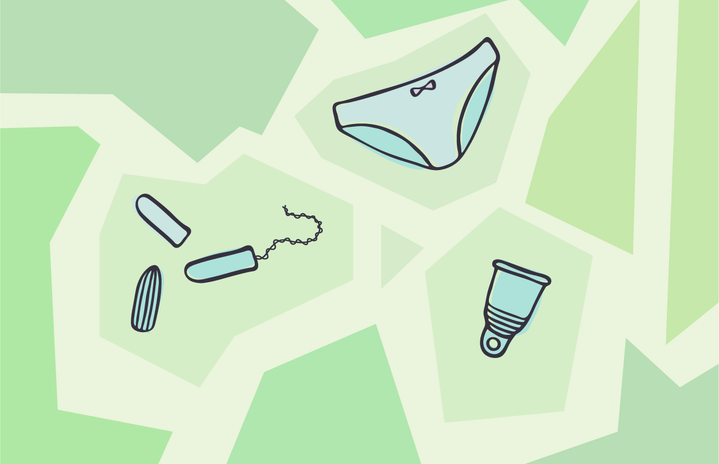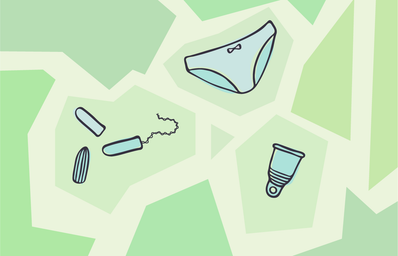I often think of my period as a total inconvenience – the cramps, the bloating and the accidental stains! I remember the times in high school when I had to stash a pad up my sleeve on the way to the washroom or when I would stand up after a lecture fearing that I might have an unexpected stain. It’s a common belief that these are the worst things about our period, but I’m here to tell you today that there’s so much more to it that what we’re privileged enough to experience.
Girls first get their period around the ages of 11 to 14, and it continues until the age of 50. Women will spend a total of six years of their lives menstruating. So… if it’s an expected biological experience for females, why is it surrounded by stigma and shame?
There’s a certain shame that lingers over female menstruation. Around the world, women and girls in the midst of their menstrual cycles may be excluded from eating certain foods, socializing or even banished to huts. Girls may skip, or even worse, be banned from attending school. Although this may stem from myths and misconceptions of certain cultures, it goes further than a cultural issue and bleeds into the economic and social obstacles they may face.
Sanjay Wijesekera, UNICEF’s former Chief of Water, Sanitation and Hygiene stated that “meeting the hygiene needs of all adolescent girls is a fundamental issue of human rights, dignity and public health.” With 52% of the international female population being of reproductive age, it’s crucial that progress is made in destigmatizing and normalizing access to addressing this biological process.
What the heck is “period poverty”?
It’s okay if you don’t know what “period poverty” means. A reported 78% of Canadians admit they aren’t familiar with the term. Period Poverty is the lack of access to sanitary products, menstrual health education and the appropriate facilities such as toilets, clean water for handwashing and waste management. One-third of Canadians under the age of 25 that menstruate report that they struggle to purchase enough menstrual products every month. There’s also a huge disparity in prices across Canada. While you can buy a box of tampons in Ontario for $5-10, the prices can range from $16-45 (or even higher) in Indigenous communities.
On July 1, 2015, the Canadian government removed what was referred to as the “tampon tax” or “pink tax” (because pink is the colour most associated with females). It’s a significant move to remove the “luxury” tax from a product that is clearly a women’s necessity, but this shows you the social standing of feminine products when you take into account how other health products, like incontinence items and prescription drugs, were exempt from this tax a long time ago.
An estimated one out of ten young women around the world are unable to afford the products they require for their period. Often necessities like food and housing are prioritized over tampons and pads. In Canada, 14% of Canadian women have had to improvise and turn to the use of alternatives such as socks, rags and old t-shirts – all options that are ineffective, unhygienic and unsafe.
Why is it a problem?
Women and girls everywhere can miss out on opportunities crucial to their growth and, as a result, are restricted from reaching their full potential. It’s reported that one out of seven Canadian girls have left school early or missed school entirely due to a lack of access to period products. Although uncommon in North America, girls around the world that face these same issues may be more likely to end up in child marriages, experience early pregnancies, be malnourished or experience domestic violence and pregnancy complications. Poor menstrual hygiene can lead to physical health risks and increases the risk of reproductive and urinary tract infections.
Period shame can cause detrimental effects to the cognitive, social, emotional and physical health to women and girls of any age. They’re often left embarrassed or disempowered with their menstrual cycle – unsure of how to approach the subject and fearful of the potential of leaks.
Beyond this, gender, health and economic inequities fuel the existence of period poverty. This isn’t about cheaper prices on pads or widely available tampons, but the fact that the female body has been and continues to be stigmatized inside and out. It’s a natural and normal human process but is seen as something that is shameful and should be silenced.
The Importance of Healthcare for Periods
The continual inequalities of menstruation are fueled by the unavailability of information, lack of sanitary infrastructure and unaffordable menstruation products; ultimately, they create a uniquely female healthcare crisis. It’s not just the inconvenience, discomfort or expenditure that women facing period poverty deal with, but it can lead to their greater exposure to physical, sexual and reproductive risks.
The bloody truth is that period poverty is gender discrimination, and the bloodier truth is that it doesn’t have to be anymore. We need a serious societal shift; the ultimate goal is to normalize menstruation and destroy its associated taboos. By providing greater access to menstrual products, sanitation facilities and hygiene education, we’ll be able to create greater menstrual equity across the globe.
Ditch the taboo and normalize having more period-centric conversations. If you can, support local charities that are working to make period products more accessible – raise awareness of their cause through re-sharing social media posts, volunteer or, if you’re able to, consider donating a package (or two!) of pads and tampons. Together, we’ll be able to make the future a period-friendlier place!



